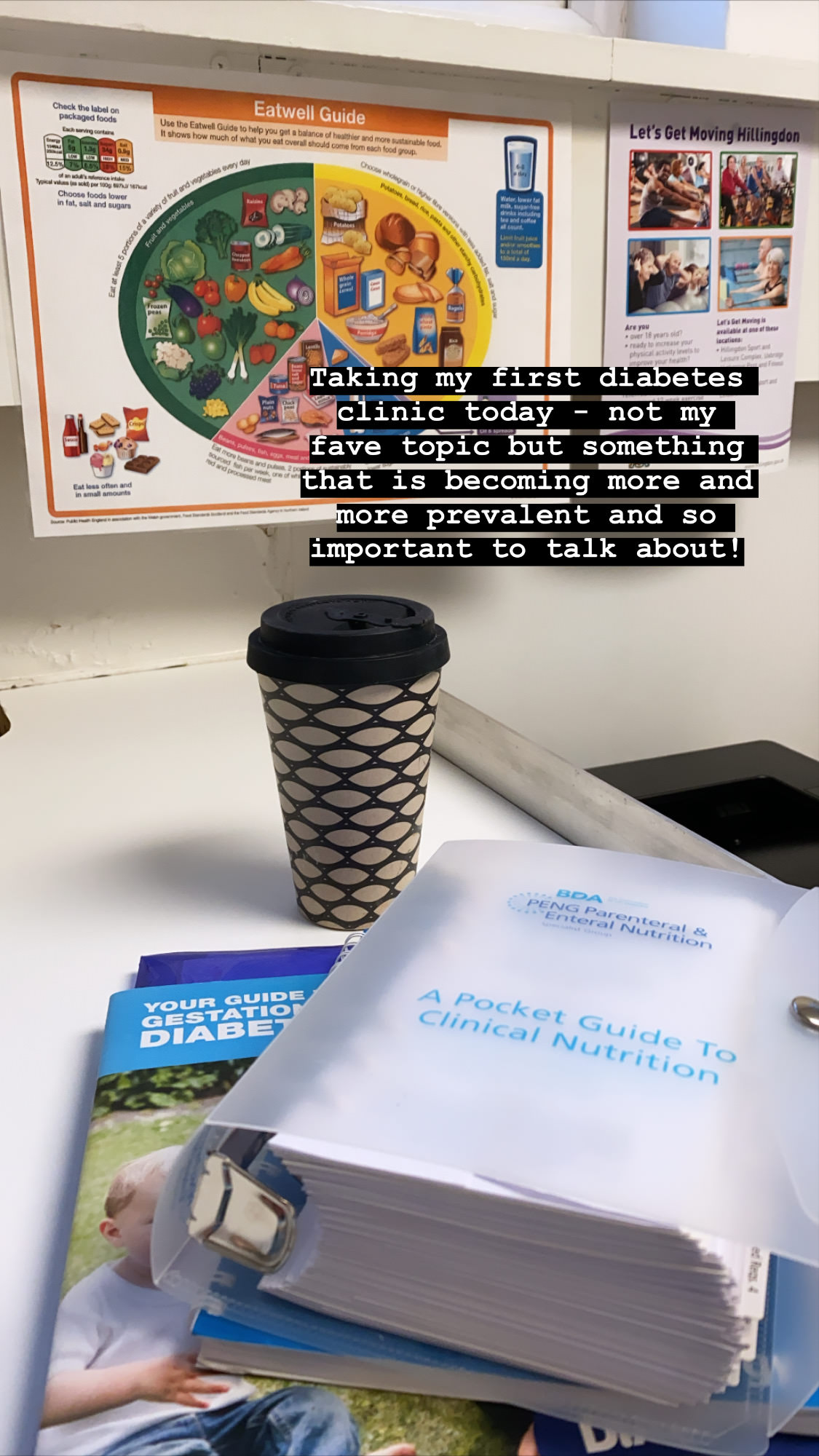Phew, first two weeks on the new job are done! Yes, I meant to do this post after finishing my first week, but life got in the way, however now that I reflect on the past two weeks the first week was very much a gentle introduction to the hospital, wards and work. This week has been full on, working 8.30-4.30 (usually 5-5.30 while I get to know the ropes).
Last night, the only reason I left work sort of on time is that I wasn’t able to see my final two patients of the day – one was moved to Intensive Care and the other was discharged home. The days are busy, but you can plan your own workload, as long as you’re seeing the patient within the 24hr window for Enteral feeding (when patients are tube fed usually through an NG in their nose to their stomachs, or through a PEG/RIG straight into their stomachs), or 48hrs for nutrition support (usually offering food fortification or supplement support).
I look after three wards plus maternity, one weekly clinic, two bi-weekly group sessions and a monthly cardio-health talk. Then when other dietitians are on annual leave, study leave or off sick, (as happened this week), I also help cover their wards.
Typically when I go to assess a patient, we go through an A-E assessment;
Anthropology – weight, height, BMI, weight loss/gain
Biochemistry – recent blood test results
Clinical – what they were admitted/referred for, current complaints (mostly I look for nausea, vomiting, lethargy, pain that might impact oral intake) past medical history, bowels, fluid balance, medications, NEWS score. I’ll also look to see if the SALT (Speech and Language Team) have written any recommendations for the patient to ensure my plan follows these.
Dietary – current and past oral intake, food record charts (filled in by the nurses, they are brilliant on my wards!), current supplements/feed regimen, discussions with patient/family/medics/nurses about intake. I then work out the patient requirements using their weight, energy and protein requirements following ESPEN guidelines, and establish whether they are meeting them or not. For me the most important thing is to
Environmental – mostly used for patients that are about to be discharged or seen in outpatient/community setting. This could be about their ability to cook and feed themselves and what help they might need. Also any other challenges at home that might be barriers to healthy eating etc such as caring for other family members. I also note down their alcohol intake and smoking status in here, as well as any conversations we have about their motivation to make changes.
We would then write a Dietetic Diagnosis – why we are seeing the patient, what we’re concerned about, the factors contributing to the issue and the evidence. eg. Patient at risk of disease related malnutrition due to NBM (nil by mouth) status and increased protein-energy requirements, as evidenced by BMI 16.5kg/m2 (underweight) and 11% weight loss in 1 month (statistically significant).
Aim – What we’e aiming to achieve from our input. This could be to halt further weight loss, to meet their requirements, to enhance oral intake.
Plan – This includes both our own plans and requests for more info from other Health Care Professionals, including monitoring oral intake on Food Record Charts, bowels on a Stool Chart, Hydration status on the Fluid Balance chart. I would also ask the medics to monitor things that I might be concerned about.
I’ll then write any supplements I have prescribed on the drug chart and handover to the nursing staff (and medical team if appropriate), send requests for specific food to the kitchen or write up a feeding regimen for their NG/NJ/PEG/RIG.
Our hospital still has paper notes which I have found a bit of a challenge (everything was online at the two hospitals I did my long placements in as a student), and it is true what they say about doctors having terrible handwriting. I’m just about getting to grips as to where to find everything in the medical notes and who to ask on each ward if I can’t decipher a word! Google is definitely my friend for a lot of the complex medical conditions. Whilst we document in the paper notes, we also have to upload our latest assessment or review into an online system too, and stat our time, as well as update a department handover sheet for each ward incase we are off sick or on annual leave.
Clinics are a little different in that they are usually coming in to a specific clinic for a specific condition, eg Type 1 or Type 2 diabetes, IBS/IBD, but we also have a general clinic (which I’m covering next week!). I see the patients for 30 mins for new patients and 15-20 for reviews, then write to the patient and the GP discussing what we covered.
My commute – I drive to work which takes anywhere between 45mins and 90 mins, meaning I have to give myself 90 mins most days just incase. I love listening to podcasts as I drive, drinking coffee and occasionally stopping for a pain au chocolat while I get fuel!
Lunch – I only get 30 mins for lunch (and last week I actually ate it while looking over patient notes most days, I’m still quite slow with my assessments so need to take all the time I can get!) and there aren’t great options at the hospital sadly so I’m mostly bringing in lunch or picking up a soup.
Gym – My to-do list for next week is to join the gym at the university nearby so that I have somewhere to shower if I run and to workout before/after work!
Overall I am loving the new challenge, enjoying the routine, and am so lucky to have lovely, supportive colleagues. And, unexpectedly without the pressure of having to blog/IG, I’m wanting to share, write and do more in that part of my life too! I even have an exciting new project launching in March…keep your eyes peeled.
Thanks for bearing with me while I transition to this new role, and be prepared for a lot more random hospital bathroom selfies, workwear posts as well as treadmill/pitch black runs!
Read more: How I Became a Dietitian and FAQ about Becoming a Dietitian





I’d be curious to read something about cardiac health from a nutrition perspective.
Sure, happy to do a post about it after my presentation!
Welcome back to consistent blogging, I love it Charlie! Hope you can keep it up! <3
Mee too Lindsay!!
Really interesting post Charlie. I work as a dietitian in Sheffield and it’s really interesting to hear just how similar the job is elsewhere even down to the paper notes! Apparently we’re going electronic ‘soon’ – ask me again in another year haha!
That would save SO much time! Honestly, I also have to type up the paper entry on to an online system. All a bit slow but fingers crossed things speed up soon! Yay for dieticians!
looking so smart in your new environment! xx
Glad the start to your job has gone well- it sounds really interesting. I like a podcast on my commute too- I used to get frustrated with the journey if the traffic was bad, but I have tried to reframe it and now think that I can listen to something for a bit longer if I am stuck in a queue.
Hi Charlie! I just wanted to say how much I appreciate your content and views, noting your qualifications and consideration in providing them. Huge thumbs up. I’m also grateful for the glimpse of how a full time 9-5er (or ish!) manages training with work and life like the rest of us! Thank you!
Haha thanks Zoe! It is such a struggle/balance – I’d forgotten just how exhausting it all is when you’re on someone else’s time and can’t just pop out for a run when you feel like it. Roll on summer and lighter mornings!
Thank you so much for this it helped me pass my interview as a NHS Dietitian.
I love that! Congratulations!